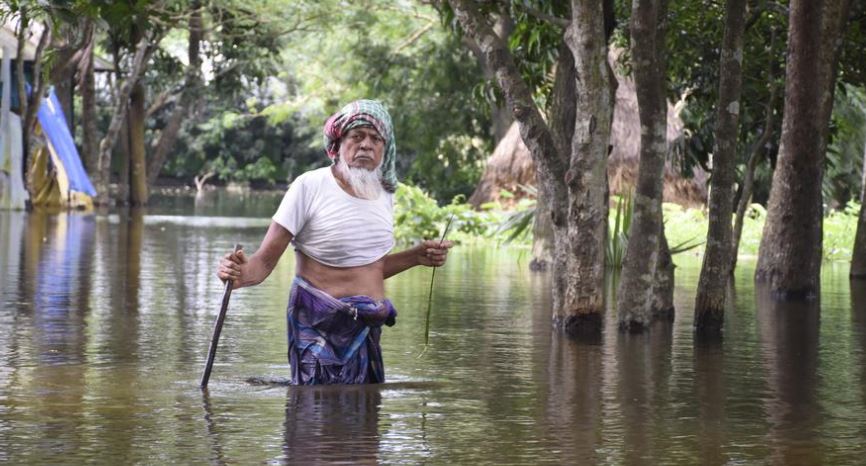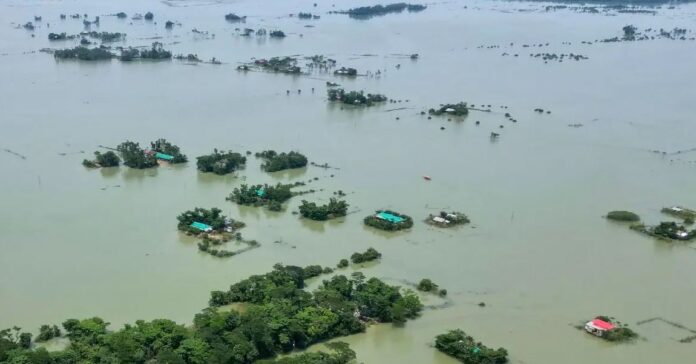Bangladesh has called for international assistance following severe floods that have struck the country since August 21, resulting in at least 71 deaths and impacting over five million people. The floods, caused by relentless monsoon rains and runoff from upstream rivers, have wreaked havoc across the region, leaving many areas submerged and in urgent need of aid.
The southeastern Fani district has been the hardest hit, with 28 fatalities reported and extensive damage to homes, farmland, and fish enclosures. In response, the government is grappling with shortages of medical supplies and emergency care. Donor agencies have pledged support for relief and rehabilitation efforts, with Türkiye among the nations sending aid packages.
Also Read: Turkey Submits Request to Join BRICS, Signaling Strategic Shift
The United Nations Children’s Fund (UNICEF) has raised alarms over the plight of over two million children at risk due to the floods, which are described as the most severe in three decades. UNICEF has launched an urgent appeal for $35 million to provide essential supplies to those affected.

The floodwaters have left more than 580,000 families stranded across 11 districts, with urgent needs for food, clean water, medicine, and dry clothing. Nearly 500 medical teams, along with the army, air force, navy, and border guard, are involved in relief efforts. The Directorate General of Health Services reported that nearly 5,000 people were hospitalized in the past 24 hours due to diarrhea, skin infections, and snake bites.
As the waters recede, concerns are growing about potential outbreaks of waterborne diseases. Authorities are working to prevent the spread of such diseases and ensure the availability of clean drinking water.

In the capital Dhaka, heavy rain has exacerbated the situation, with many districts submerged under knee-deep to waist-high water, causing massive traffic jams and further disruption.
A preliminary assessment by the agriculture ministry reveals that crops worth 33.5 billion taka ($282 million) have been damaged, affecting over 1.4 million farmers. A 2015 World Bank Institute analysis estimated that 3.5 million people in Bangladesh are at risk of annual river flooding, a threat that has intensified in recent years due to climate change.

Emma Brigham, Deputy Representative of UNICEF Bangladesh, highlighted the devastating impact of climate change on children: “Year after year, the lives of millions of children in Bangladesh are being devastated by floods, heatwaves, and cyclones. Climate change is clearly altering children’s lives.”

Key Points:
Request for International Aid: Bangladesh has sought international assistance following severe floods that began on August 21, resulting in at least 71 deaths and affecting over five million people.
- Severe Impact in Fani District: The southeastern Fani district is the worst affected, with 28 fatalities and significant damage to homes, farmland, and fish enclosures.
- Relief Efforts and Shortages: The government faces shortages of medical supplies and emergency care. Donor agencies, including Türkiye, have pledged support for relief and rehabilitation efforts.
- Children at Risk: UNICEF has warned that over two million children are at risk due to the floods and has launched a $35 million appeal for essential supplies.
- Flood-Related Challenges: More than 580,000 families are stranded in 11 flood-hit districts, with urgent needs for food, clean water, medicine, and dry clothing. Medical teams and military personnel are involved in relief operations.
- Health Concerns: Nearly 5,000 people have been hospitalized for waterborne diseases and other health issues. Efforts are being made to prevent disease outbreaks and ensure clean drinking water.
- Infrastructure and Agriculture Damage: Heavy rain has caused severe flooding in Dhaka, leading to traffic jams and road submersion. Preliminary assessments indicate crop damage worth 33.5 billion taka ($282 million), impacting over 1.4 million farmers.
- Climate Change Impact: The floods highlight the increasing risk of river flooding in Bangladesh due to climate change, with a 2015 World Bank Institute analysis estimating 3.5 million people at risk annually.
- Calls for Action: UNICEF and local organizations emphasize the need for urgent aid and long-term solutions to address the impact of climate change and prevent future disasters.



